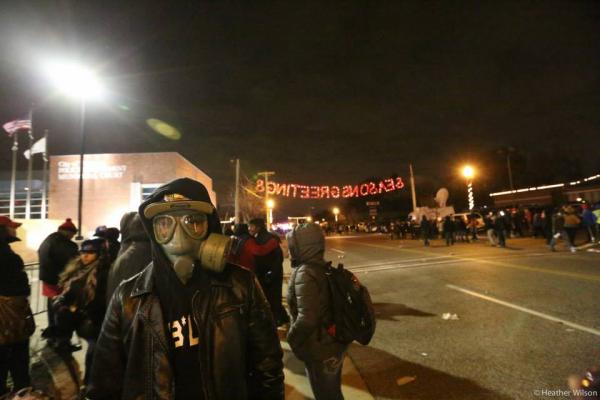Many black families woke up this morning knowing that the lives of their children are worth less than the lives of white children in America. The deep distrust of law enforcement in their own communities that so many African Americans feel just got deeper last night — 108 days since the killing of unarmed teenager Michael Brown — when the prosecuting attorney announced the decision not to subject the police officer who killed Brown to a trial where all the facts could be publically known and examined.
We now all have the chance to examine the evidence — released last night — in the grand jury’s decision not to indict white police officer Darren Wilson, who fired multiple bullets into Michael Brown. But the verdict on America’s criminal justice system is already in for many Americans: guilty, for treating young black men differently than young white men.
According to veteran prosecutors and defense attorneys, many things were unusual about the grand jury that ultimately decided not to indict Wilson. But most unusual may have been the decision to hold the news until after dark — as anxiety rose and hundreds gathered on the street. The decision was reportedly in by 2 p.m., so why did authorities wait seven hours to announce it? Why did they wait until people were off work and anxious young crowds had gathered outside police headquarters in Ferguson? Focus quickly turned from the grand jury’s decision to the response in the streets. While most protestors remained peaceful, the media naturally focused on the very unfortunate violence.
Other large questions remain. Why did prosecutor Robert P. McCulloch never mention in his long statement last night that Michael Brown was unarmed? Why did a trained police officer decide he had no other option than to shoot more bullets into Brown after he had fled their confrontation? Why did anyone have to die? Why did a prosecutor, in his long 25 minutes of explanation of why Wilson was not indicted, sound more like a defense attorney for the police officer instead of an advocate for the unarmed teenager who was shot and killed? Why were the “conflicting accounts” of the confrontation between Officer Wilson and Michael Brown not subjected to a trial? The resulting decision from the grand jury was completely foreseeable in a nation where police officers are almost never indicted for the use of deadly force — especially when it is white police officers killing black people.
It was a very sad night for America. I echo St. Louis area pastor, Rev. Traci Blackmon’s words this morning: “I hurt, I really hurt for the young people who did everything they could to be peaceful and nonviolent and to raise their voice; but the anger and rage of a few made the narrative very different this morning.” Even though most of the protests in Ferguson and around the country were peaceful, it was painful to watch President Obama speaking to the nation on a split screen with scenes of violent protest in Ferguson. In his powerful speech, the president spoke the truth when he said, “We need to recognize that this is not just an issue for Ferguson; this is an issue for America.” He also reminded the nation of the recent words of Michael Brown Sr., the dead boy’s dad, words that have touched many of us so deeply.
The dad who lost his son said, “Hurting others or destroying property is not the answer. No matter what the grand jury decides, I do not want my son’s death to be in vain. I want it to lead to incredible change, positive change, change that makes the St. Louis region better for everyone.”
It’s time for us all to honor the wishes of Michael Brown’s father and mother. Whatever the facts might have revealed in the trial that will never happen, the time is long overdue to subject our criminal justice system to the requirements of racial justice. The racialization of that system and its policing behavior toward people of color is beyond dispute. The police force in Ferguson that is completely unrepresentative of the community and whose behavior has caused such deep alienation among the people they are supposed to serve and protect has become a parable. Ferguson has become a parable in America, for how black lives are less important in the ways our laws are enforced. Ferguson is not only in Ferguson.
Dr. Martin Luther King Jr., the nation’s apostle of nonviolence, once said: ”a riot is the language of the unheard.” He also showed us that only disciplined, sacrificial, and nonviolent social movements can change things.
It is time to right the unacceptable wrong of black lives being worth less than white lives in our criminal justice system. The broken relationships between law enforcement officials and their communities are deeply felt and very real. How law enforcement interacts with communities of color raises fundamental, legitimate issues that must be addressed by the whole nation if we are to move forward. The changes we need in both policies and practices must now be taken up in detail. Our neglect has led to anger and hopelessness in a new generation, but their activism will also help lead us to new places. It is indeed time to turn Ferguson from a moment to a movement, and Michael Brown’s life and death must not be allowed to be in vain.
Jim Wallis is president of Sojourners. His book, The (Un)Common Good: How the Gospel Brings Hope to a World Divided, the updated and revised paperback version of On God’s Side, is available now. Follow Jim on Twitter @JimWallis.
Got something to say about what you're reading? We value your feedback!
